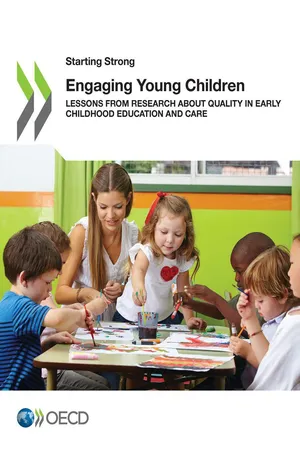eBook - ePub
Engaging Young Children
OECD,
Tools to learn more effectively

Saving Books

Keyword Search

Annotating Text

Listen to it instead
Information
Chapter 1. Overview: Promoting quality early childhood education and care, child development and learning
Research shows that quality early childhood education and care (ECEC) affects children’s development and learning. There is consensus that process quality, such as the quality of staff-child interactions and developmental activities, is the primary driver of gains in children’s development through ECEC. This report builds on a cross-national literature review examining the relations between structural indicators, such as child-staff ratios, and process quality in settings for children aged 3 to 5, aged 0 to 2, including family daycare settings. It also provides insights from a new meta-analysis of the linkages between quality and child learning and development. This overview chapter describes how ECEC provision has expanded and emphasises the importance of better understanding and defining ECEC quality. It highlights key findings and explains their linkages to policy levers such as standards and governance; workforce development and working conditions; data and monitoring.
The statistical data for Israel are supplied by and under the responsibility of the relevant Israeli authorities. The use of such data by the OECD is without prejudice to the status of the Golan Heights, East Jerusalem and Israeli settlements in the West Bank under the terms of international law.
Introduction
The effects of quality early childhood education and care (ECEC) on children’s development and learning have been well established in the literature, and there is a general consensus that process quality is the primary driver of children’s development in ECEC (Melhuish et al., 2015[1]). The OECD Starting Strong reports (Organisation for Economic Co-operation and Development (OECD, 2001[2]; 2006[3]; 2011[4]; 2015[5]; 2017b[6]) and other international research point out that high-quality ECEC is beneficial for children’s early development and their subsequent school performance in various domains, such as language use and emerging academic skills, early literacy and numeracy, and socio-emotional skills (Burchinal, 2016[7]; Cappella, Aber and Kim, 2016[8]; Melhuish et al., 2015[1]; Yoshikawa and Kabay, 2015[9]). The OECD’s Programme for International Student Assessment (PISA) study suggests that 15-year-old students who attended early childhood education for less than one year are 3.1 times more likely than students who attended for one year or more to perform below the baseline level of proficiency in science (this decreases to 2.3 times after accounting for socio-economic status), see Figure 1.1 (OECD, 2017a[10]).
Figure 1.1. Proportion of low performers among 15-year-old pupils according to the numbers of years spent in early childhood education (PISA 2015)

Notes: Countries and economies are ranked in ascending order of the percentage of low-performing students who did not attended early childhood education (ISCED 0) or attended for “less than one year”. Low performers may be able to use basic or everyday scientific knowledge to recognise or identify aspects of familiar or simple scientific phenomena. However, they also often confuse key features of a scientific investigation, apply incorrect scientific information and mix personal beliefs with scientific facts in support of a decision.
* Note by...
Table of contents
- Title page
- Legal and rights
- Foreword
- List of abbreviations
- Executive summary
- Chapter 1. Overview: Promoting quality early childhood education and care, child development and learning
- Chapter 2. Standards and governance for quality early childhood education and care
- Chapter 3. Supporting quality early childhood education and care through workforce development and working conditions
- Chapter 4. Data and monitoring to improve quality in early childhood education and care
- Chapter 5. Key insights and avenues for further research
- Annex A. List of network member contributors
- Annex B. Literature review method
- Annex C. Meta-analysis method
- About the OECD
Frequently asked questions
Yes, you can cancel anytime from the Subscription tab in your account settings on the Perlego website. Your subscription will stay active until the end of your current billing period. Learn how to cancel your subscription
No, books cannot be downloaded as external files, such as PDFs, for use outside of Perlego. However, you can download books within the Perlego app for offline reading on mobile or tablet. Learn how to download books offline
Perlego offers two plans: Essential and Complete
- Essential is ideal for learners and professionals who enjoy exploring a wide range of subjects. Access the Essential Library with 800,000+ trusted titles and best-sellers across business, personal growth, and the humanities. Includes unlimited reading time and Standard Read Aloud voice.
- Complete: Perfect for advanced learners and researchers needing full, unrestricted access. Unlock 1.4M+ books across hundreds of subjects, including academic and specialized titles. The Complete Plan also includes advanced features like Premium Read Aloud and Research Assistant.
We are an online textbook subscription service, where you can get access to an entire online library for less than the price of a single book per month. With over 1 million books across 990+ topics, we’ve got you covered! Learn about our mission
Look out for the read-aloud symbol on your next book to see if you can listen to it. The read-aloud tool reads text aloud for you, highlighting the text as it is being read. You can pause it, speed it up and slow it down. Learn more about Read Aloud
Yes! You can use the Perlego app on both iOS and Android devices to read anytime, anywhere — even offline. Perfect for commutes or when you’re on the go.
Please note we cannot support devices running on iOS 13 and Android 7 or earlier. Learn more about using the app
Please note we cannot support devices running on iOS 13 and Android 7 or earlier. Learn more about using the app
Yes, you can access Engaging Young Children by OECD in PDF and/or ePUB format, as well as other popular books in Social Sciences & Sociology. We have over one million books available in our catalogue for you to explore.
